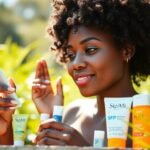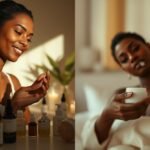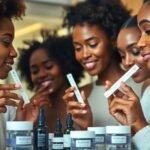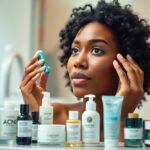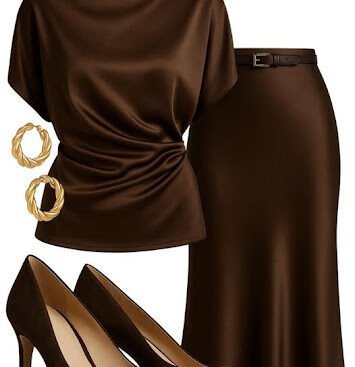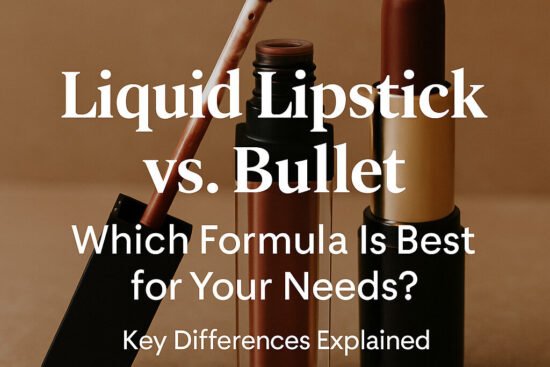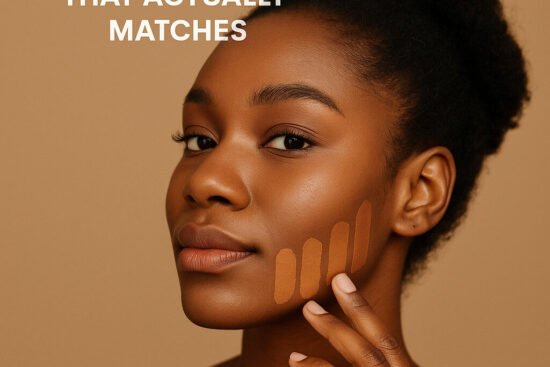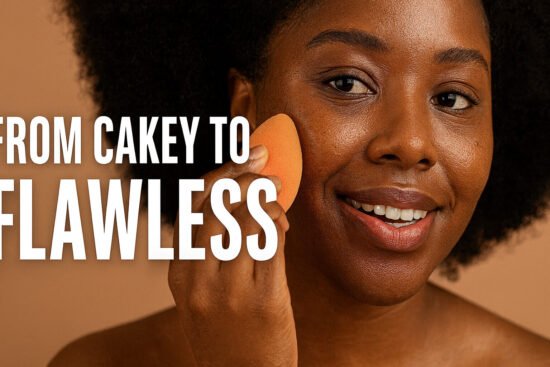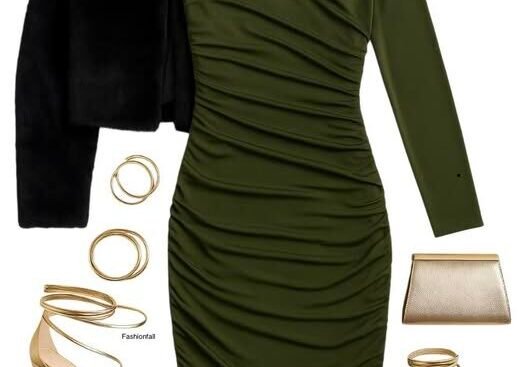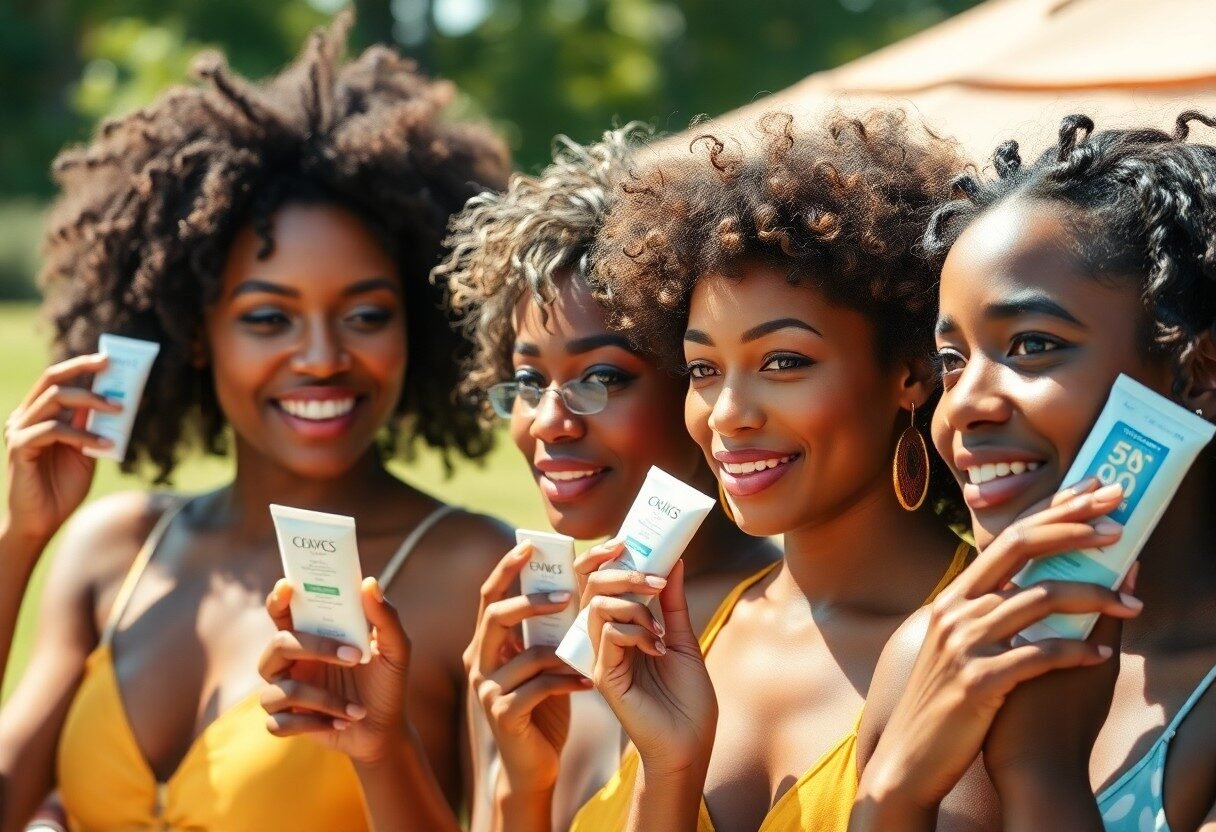
Many people underestimate the importance of sunscreen, especially for African American women. Although your skin contains more melanin, which offers some natural protection, you are still at risk for skin damage and skin cancer. Choosing the right sunscreen can enhance your skin health and prevent premature aging. In this post, I will guide you through the best sunscreens tailored specifically for your unique skincare needs, ensuring you have the optimal protection while enjoying the sun.
Key Takeaways:
- Choose broad-spectrum sunscreens to protect against both UVA and UVB rays, which can cause skin damage and increase the risk of skin cancer.
- Select sunscreens with an SPF of 30 or higher for optimal protection, considering reapplication every two hours, especially when outdoors.
- Look for mineral-based sunscreens containing zinc oxide or titanium dioxide, which provide a physical barrier against the sun and are less likely to irritate sensitive skin.
- Opt for tinted sunscreens or products with a subtle tint to help blend with deeper skin tones, preventing a white cast often seen with some sunscreen formulations.
- Consider moisturizing sunscreens that provide hydration alongside protection, as many African American women may have unique skin needs.
- Test for sensitivity or irritation by conducting a patch test before fully committing to a new sunscreen product.
- Stay informed about the latest SPF innovations and formulations to find products that best suit your skin type and lifestyle needs.
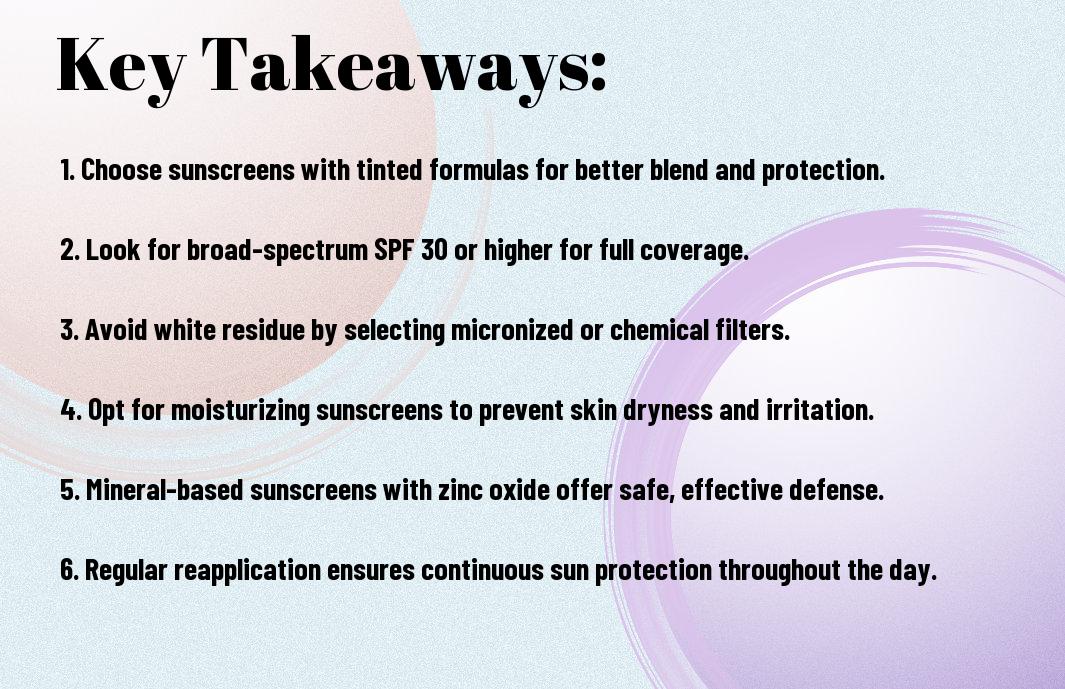
The Unique Skincare Needs of African American Women
Melanin and Sun Protection
Melanin, the pigment that gives skin its color, offers *some level of natural protection against the sun*, often leading to the misconception that African American skin doesn’t need sunscreen. In reality, *even deeper skin tones can suffer from sun damage*, such as hyperpigmentation and increased risk of skin cancers. Broad-spectrum sunscreens with *SPF 30 or higher* are important to protect against both UVA and UVB rays, helping to maintain an even skin tone and overall skin health.
Common Skin Concerns
Women of color often experience specific skin concerns such as *hyperpigmentation*, *keloid formation*, and *ashy or dry skin*. These conditions require tailored skincare solutions that address the unique needs of darker skin tones. Using products that cater to these challenges not only enhances skin appearance but also promotes long-term health and vitality.
Hyperpigmentation, a common issue stemming from inflammation or sun exposure, can leave behind dark spots that are *difficult to treat*. Research indicates that *over 50% of African American women report dealing with this skin concern*. Ingredients like vitamin C, licorice root extract, and niacinamide can help combat these issues effectively. Additionally, keloid formation can occur in response to skin trauma, making proper care and gentle treatment important to preventing further complications. Ashy skin can also lead to a dull complexion, prompting the need for rich moisturizers that keep your skin hydrated and luminous while ensuring that you maintain your natural glow.
Debunking Myths About Sunscreen
Understanding SPF and Broad Spectrum
The *Sun Protection Factor (SPF)* measures how effectively a sunscreen protects your skin from UVB rays, which are primarily responsible for sunburn. An SPF of 30 blocks about 97% of UVB rays, while SPF 50 blocks approximately 98%. Choosing a *broad-spectrum* sunscreen is vital, as it protects against both UVA rays—linked to skin aging and cancer—and UVB rays. Remember to apply it generously and reapply every two hours, especially when swimming or sweating.
Addressing Skin Tone Misconceptions
Many African American women may believe that melanin provides sufficient protection against sun damage, but this is a harmful misconception. While darker skin has a natural SPF of about 13, it does not mean you’re immune to the negative effects of UV rays. Research shows that hyperpigmentation and skin cancer can still affect those with darker skin tones, making sunscreen an vital part of your skincare routine.
Additionally, the idea that darker skin doesn’t need sunscreen can lead to a false sense of security. In fact, studies have shown that Black individuals often experience higher rates of skin cancer at later stages because of late diagnoses. Even if your skin doesn’t burn easily, the risks of UV damage still exist. By incorporating sunscreen into your daily regimen, you protect not only your skin’s health but also its overall appearance, maintaining an even skin tone and preventing premature aging.
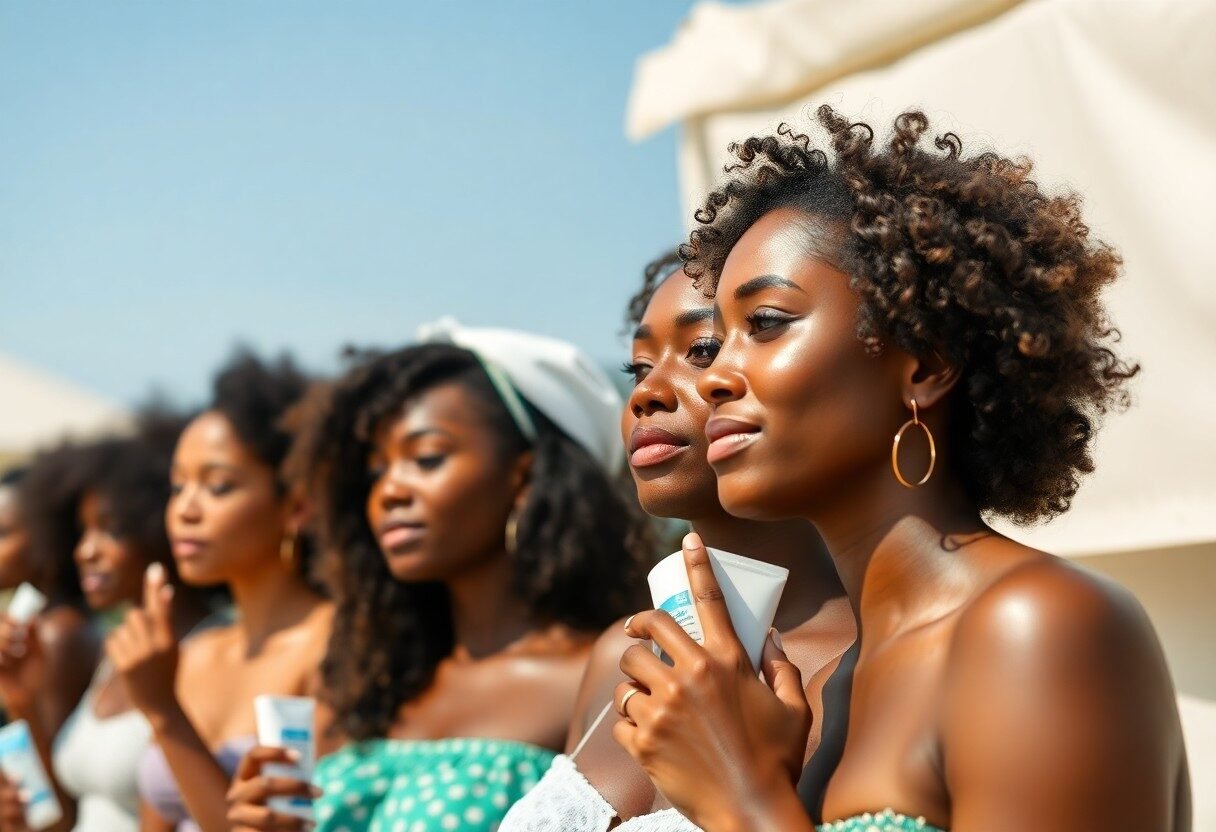
Key Ingredients for Effective Sunscreens
Mineral vs. Chemical Sunscreens
Choosing between mineral and chemical sunscreens ultimately depends on your skin type and preferences. Mineral sunscreens contain active mineral ingredients like zinc oxide and titanium dioxide, which sit on top of the skin and provide a physical barrier against UV rays. On the other hand, chemical sunscreens absorb UV rays through their chemical filters, offering a lightweight feel that many prefer. For African American women, mineral options are often more suitable since they tend to be less irritating and blend more seamlessly into darker skin tones.
Beneficial Additives for Darker Skin
Formulations designed for darker skin tones often incorporate hydrating ingredients and antioxidants to enhance skin health while providing sun protection. Look for sunscreens that include vitamins C and E, which not only protect against UVA-induced damage but also help in evening skin tone and reducing hyperpigmentation. Additionally, products with nourishing oils or butters can provide imperative moisture for maintaining a radiant complexion.
Ingredients like niacinamide and shea butter can also make a significant difference in your sunscreen choice. Niacinamide works wonders in reducing dark spots and improving skin texture, making it ideal for daily use. Meanwhile, shea butter offers deep hydration, ensuring your skin retains its elasticity and glow. Formulas featuring these beneficial additives tackle common concerns like uneven skin tone and dryness, while still delivering effective sun protection tailored for your unique skin needs.
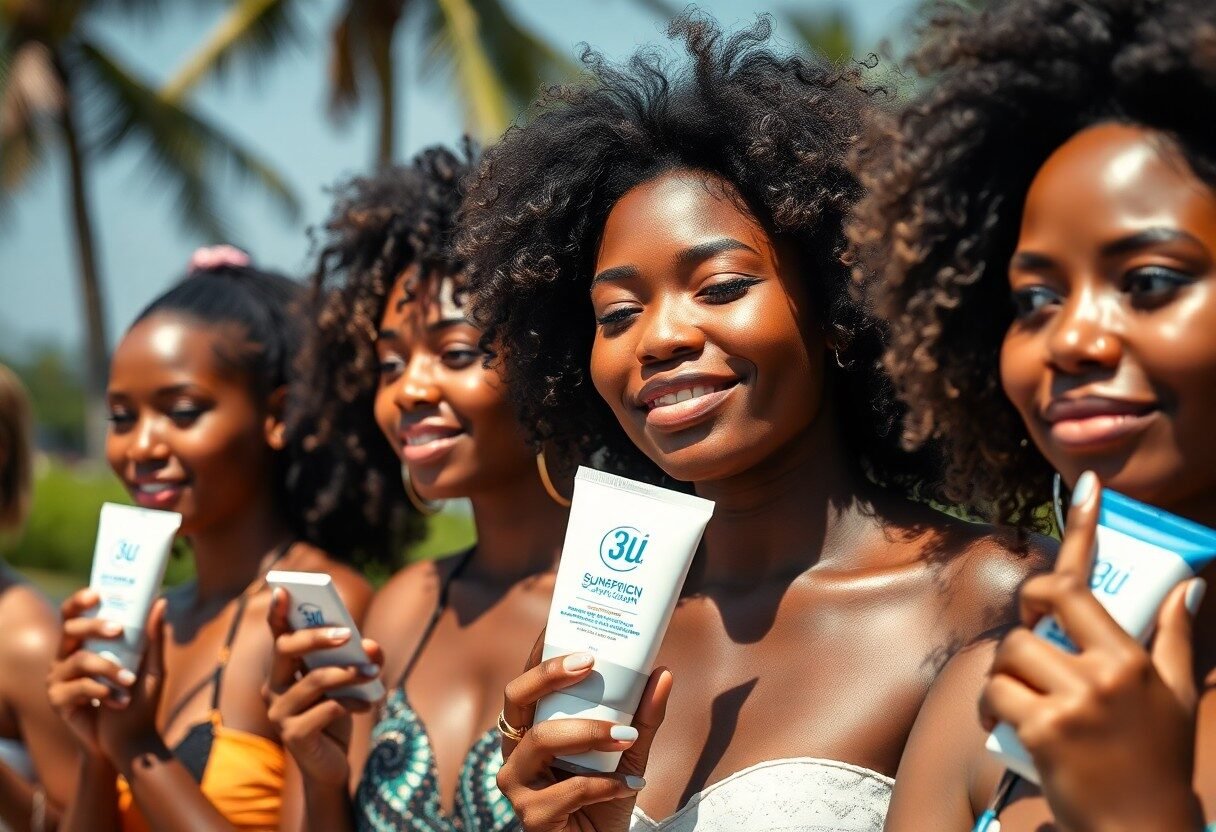
Top Sunscreens for Diverse Skin Tones
Best Drugstore Options
Drugstore sunscreens have come a long way, providing excellent sun protection at affordable prices without leaving a white cast. I recommend looking into brands like Neutrogena Ultra Sheer Dry-Touch SPF 100 and CeraVe Hydrating Mineral Sunscreen SPF 30, both of which offer broad-spectrum protection and work well with darker skin tones. These choices blend smoothly and hydrate the skin, making them ideal for daily use. Plus, their accessibility makes them stand out in your skincare routine.
Luxury Brands Leading the Way
Luxury brands often prioritize high-quality ingredients and formulations that cater to a diverse range of skin tones. Options like Supergoop!, with its lightweight, non-greasy formula, and Dr. Barbara Sturm, known for its premium sun protection that avoids the typical white cast, are fantastic choices. Their thoughtful formulations address not only sun protection but also skin health, making them worthy investments for anyone looking to enhance their skincare regimen.
Brands like Shiseido and La Roche-Posay have also made noteworthy strides in luxury sun protection. Shiseido offers a unique, invisible sunscreen that absorbs quickly and works seamlessly on deeper skin tones. La Roche-Posay’s Anthelios line is celebrated for its innovative formulations that blend effortlessly while providing long-lasting protection. Investing in these luxurious options often pays off in the form of superior texture and skin benefits, aligning perfectly with the needs of African American women aiming for both style and effectiveness.
Application Tips for Optimal Protection
Applying sunscreen correctly ensures you receive the maximum protective benefits. Here are some practical tips to guarantee you’re using your sunscreen effectively:
- Always apply your sunscreen liberally; use about a nickel-sized amount for your face and at least an entire shot glass for your body.
- Apply it at least 15 minutes before heading outdoors to allow it to absorb properly into your skin.
- Don’t forget often-overlooked areas like your ears, backs of hands, and the part in your hair.
- Reapply every two hours, or immediately after swimming or sweating.
- If using makeup, consider a powder or spray sunscreen for convenient reapplication throughout the day.
Knowing these tips helps ensure you’re getting the full protective benefits of your chosen sunscreen.
How to Layer Sunscreen with Other Products
Layering your sunscreen with other skincare and makeup products can be straightforward. Start with a clean, moisturized face, applying your moisturizer first, followed by your sunscreen. If you’re using a tinted moisturizer or makeup, let the sunscreen sit for a few minutes before proceeding. This method maximizes your skin’s hydration while still providing excellent sun protection.
Frequency of Application and Reapplication
Applying sunscreen isn’t a one-and-done task; it requires ongoing attention throughout the day. Typically, you should reapply every two hours if you’re outdoors. If swimming or sweating heavily, reapply immediately afterward, ensuring your skin stays protected.
Even in the shade or during cloudy days, UV rays can penetrate through clouds, so staying consistent with reapplication is key. Many find convenience in using a sunscreen stick, spray, or powder for quick and easy reapplying, especially when in makeup. This becomes part of a routine that not only protects your skin in the moment but also contributes to long-term skin health while combating potential skin concerns for African American women.
Sunscreen and Skin Health: Long-term Benefits
Protecting Against Skin Cancer
Using sunscreen daily significantly reduces the risk of skin cancer, even for those with darker skin tones. According to the American Academy of Dermatology, skin cancer rates among African American women are lower compared to lighter-skinned individuals, but that doesn’t eliminate the risk. Incorporating a broad-spectrum sunscreen into your routine shields your skin from harmful UVA and UVB rays, which play a key role in skin cell damage and cancer development.
Maintaining Even Skin Tone and Texture
Consistent use of sunscreen helps maintain your skin’s natural radiance and prevents conditions like hyperpigmentation. Sun exposure can exacerbate dark spots and uneven skin tone, particularly for individuals with melanin-rich skin. By applying sunscreen daily, you protect your skin from discoloration and promote a more balanced complexion.
Hyperpigmentation is a prevalent concern for many African American women, often resulting from sun damage or inflammatory conditions. Sunscreen acts as a barrier against the sun’s harsh rays, preventing further darkening of existing spots and helping your skin maintain a smoother texture. A broad-spectrum sunscreen with at least SPF 30 is recommended for effective protection, ensuring that your skin remains vibrant and even-toned throughout the years. Prioritizing sun protection not only preserves your complexion but also boosts your confidence in your skin’s health.
Personalizing Your Sunscreen Routine
Identifying Your Skin Type
Understanding your skin type is fundamental to finding the right sunscreen. For example, if you have oily skin, you might prefer a lightweight, oil-free formula that won’t clog your pores. On the other hand, dry skin often benefits from a more moisturizing sunscreen enriched with hydrating ingredients. Knowing whether your skin is sensitive, combination, or normal will lead you to choices that minimize irritation and maximize protection.
Choosing Products for Specific Lifestyles
Your lifestyle can influence your sunscreen choice significantly. For active individuals or those spending prolonged periods outdoors, a water-resistant formula is ideal. If you frequently travel or need makeup that lasts all day, consider a tinted sunscreen for sheer coverage, or one that doubles as a primer. Specific activities, such as swimming or hiking, call for products that provide long-lasting and reliable protection.
For instance, if you’re an athlete, opting for a sunscreen with a high SPF of 50 or above, along with broad-spectrum protection, ensures that sweat and water exposure don’t compromise your skin’s safety. Urban dwellers might benefit from sunscreens that include antioxidants to combat pollution. My choice of sunscreen also leans towards products with added skincare benefits, such as hyaluronic acid or niacinamide, which can help keep my skin balanced and radiant throughout the day.
Expert Opinions: Dermatologists on Sunscreen for Dark Skin
Recommendations from Professionals
Dermatologists consistently emphasize the need for daily sunscreen use, particularly for African American women. They recommend opting for broad-spectrum formulas with at least SPF 30 to ensure effective protection against UVA and UVB rays. Many experts also advise choosing sunscreens with moisturizing ingredients to keep skin hydrated while guarding against damage. Products that contain antioxidants can offer additional defense against pollution and free radicals, enhancing overall skin health.
Common Pitfalls to Avoid
One significant oversight is applying too little sunscreen. Many individuals, including women of color, often underestimate the amount needed for adequate coverage. The recommended amount is about one ounce (or a shot glass full), which can seem excessive but is necessary for optimal protection. Additionally, relying solely on makeup with SPF can lead to inadequate application. This often creates a false sense of security, leaving skin vulnerable to damage.
I often see clients who assume their darker skin tone means they don’t need sunscreen, which can lead to serious misconceptions. It’s easy to fall into the trap of thinking that melanin provides sufficient protection, but even deeper skin tones can suffer from hyperpigmentation, premature aging, and skin cancer. Ensuring you apply enough sunscreen and avoiding the misconception that makeup SPF is sufficient will go a long way in protecting your skin’s health for the long term. Using a comprehensive skincare routine alongside professional recommendations will yield the best results in maintaining healthy, radiant skin.
To wrap up
Now that I’ve shared the best sunscreens for African American women, I hope you feel empowered to choose the right product for your skin type and lifestyle. Understanding the unique needs of your skin is necessary for maintaining its health and appearance. By using a broad-spectrum sunscreen that suits your complexion, you can confidently enjoy the sun while protecting your skin from harmful UV rays. Take this time to explore your options and invest in a sunscreen that will keep your skin radiant and well-protected.
FAQ
Q: Why do African American women need to use sunscreen?
A: Despite having more melanin, which provides some natural protection against UV rays, African American skin is still susceptible to sun damage. Sunscreen helps prevent premature aging, hyperpigmentation, and increases the risk of skin cancer. Therefore, it is important for African American women to wear sunscreen daily.
Q: What ingredients should I look for in sunscreen for my skin?
A: For African American women, it’s best to look for sunscreens that contain broad-spectrum protection with SPF 30 or higher. Ingredients like zinc oxide and titanium dioxide are excellent for sensitive skin, while chemical filters like avobenzone, octisalate, and octocrylene can provide effective protection without leaving a white cast.
Q: Will sunscreen leave a white cast on my skin?
A: Many sunscreens, especially those with physical blockers like zinc oxide, can leave a white residue. However, there are formulations specifically designed for darker skin tones that absorb well and don’t leave a cast. Look for tinted sunscreens or those specifically labeled as suitable for darker skin. These often blend seamlessly into the skin.
Q: How often should I reapply sunscreen?
A: It’s recommended to reapply sunscreen every two hours, especially if you are swimming or sweating. If you are using a spray sunscreen, ensure that you are applying enough product to cover all exposed skin thoroughly. It’s also advisable to reapply after towel drying.
Q: What is the difference between chemical and physical sunscreens?
A: Chemical sunscreens absorb UV radiation through their chemical ingredients and convert it into heat, which is then released from the skin. Physical sunscreens, on the other hand, sit on top of the skin and reflect UV rays. For African American women, physical sunscreens may be better choices due to their gentleness and effectiveness without the risk of irritation.
Q: Can I use makeup with SPF instead of sunscreen?
A: While makeup products with SPF provide some level of protection, they usually do not offer sufficient coverage to replace a dedicated sunscreen. It’s advisable to use sunscreen as a base layer. Makeup with SPF can be applied on top for additional protection throughout the day.
Q: Are there specific sunscreens recommended for darker skin tones?
A: Yes, there are several sunscreens formulated specifically for darker skin tones that minimize the risk of a white cast. Look for brands like Black Girl Sunscreen, Fenty Beauty, and Neutrogena’s Hydro Boost line. These products offer effective protection while being designed to blend well with deeper skin tones.
